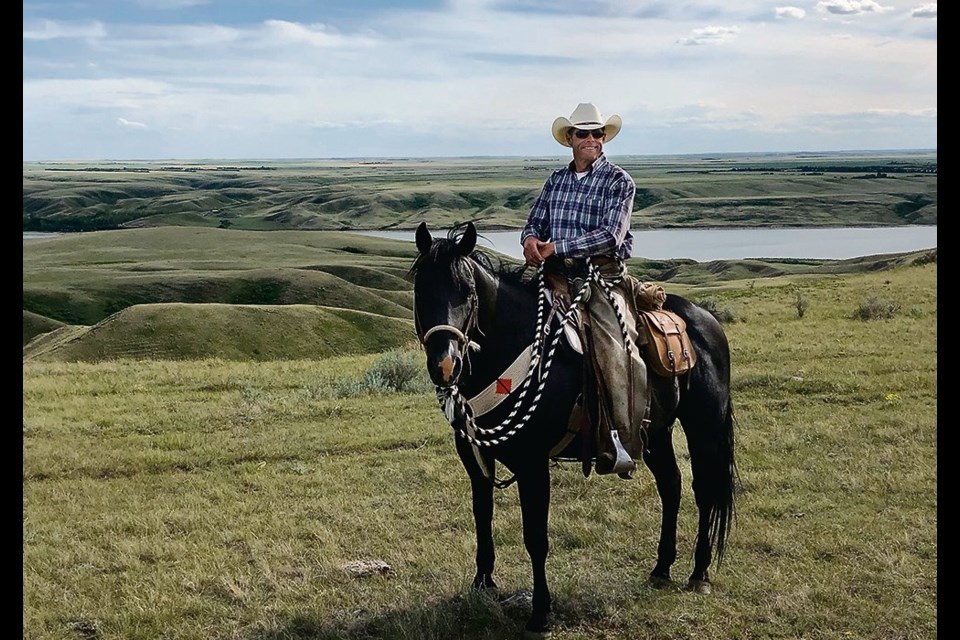LAKE DIEFENBAKER - George Gaber instantly knew La Raeta Ranch was going to be his new home when he first visited the place more than 25 years ago.
“We camped out overnight along the Swift Current Creek and that really hit me. I thought I was in a movie setting,” he said.
“It rained all night. We got poured on. Everything was soaking wet. But it was still so much fun.”
Gaber was born and raised on a farm in Germany. His first exposure to Saskatchewan came in 1995 when he took a two-week summer vacation on a guest ranch near Tisdale.
He came back to the province later that winter looking for a spot of his own and fell in love with the 5,000 acre property he now owns along the shores of Diefenbaker Lake, about 45 minutes north of Swift Current.
That was the beginning of La Reata Ranch, a working cattle and guest ranch located in the coulees along the South Saskatchewan River.
The ranch consists of eight western-style wood cabins, a recently rebuilt cookhouse, a saloon, plenty of pasture, 23 Quarter Horses and 120 Black Angus cow/calf pairs.
Sadly, the cabins are sitting empty these days. About 95 percent of Gaber’s visitors are tourists from Europe.
COVID-19 brought an abrupt halt to international travel starting in March 2020 and he is still feeling the pinch of the global pandemic well into the summer of 2021.
Business has slowed to a trickle for two straight years after a phenomenal 2019. On top of it all, the ranch has been ravaged by drought, threatening his cattle herd.
He can’t get a bale off his 100 acres of triticale and 300 acres of tame grass and the pasture land is brown and crispy. The only bales he can find near Regina are selling for $250 a bale.
“It’s devastating,” said Gaber.
He could be forced to make some tough decisions this fall.
In the meantime, he continues to be frustrated by the lack of clarity and transparency from the federal government regarding international travel.
Operations like his that rely on tourism have been living month-by-month waiting for news out of Ottawa.
At times Gaber considered switching tactics and promoting the ranch to Canadians but he was concerned the border would suddenly open and he would be double-booked.
Besides, Canadians tend to only want to stay for a weekend while his European visitors typically book a week or two. They are the backbone of his business, accounting for 95 percent of his revenue.
The border is supposed to open to vaccinated international travelers on September 7, 2021 but nothing is set in stone and visitors are reluctant to book.
Many Europeans dream of living the cowboy lifestyle for a week, herding cows on horseback with a dog trailing behind.
Gaber offers them a cherished escape from the daily rat race at a cost of $214 per night per person.
It usually takes them a few days to adjust. At first they are waking up at 5:00 a.m. wanting to know what’s on the agenda and constantly pulling out their cell phones. By day three Gaber has to wake them up.
They are amazed by the wide open spaces and the plethora of stars in the night sky. There are no neighbors in sight at the bottom of the valley, just the occasional deer, coyote, fox, owl or golden eagle.
“There’s no light pollution. There’s no buildings. You don’t see nothing. They just love it,” he said.
“They can finally calm down because there is no cell phone service in the bottom of the coulee.”
The day begins with a hearty breakfast and then the horses just show up, waiting to be groomed and saddled.
Guests ride all morning and then typically stop for a campfire lunch followed by a siesta on a hillside. In the afternoon they might move some cows or check a fence line.
After supper the guests go to the saloon or sit around the campfire and talk about the day’s adventures. Occasionally there will be a trip to the White Bear Saloon for some chicken wings or to buy some western wear at a nearby clothing store.
But guests often don’t want to budge from the ranch after traveling halfway around the world.
The horses roam free around the ranch and require little maintenance.
“You don’t have to brush them,” said Gaber.
“They’ll do it on their own. They roll around in the grass and they’re good. Just let them go.”
Other activities include swimming, boating and canoeing on the lake. But this year the water level is too low for most of those endeavoUrs and besides, there are no guests to frolic in the water.
The thing Gaber misses the most is interacting with his visitors, reading their comments in the guestbook and bidding them farewell.
“They get tears in their eyes when they leave (and they say), ‘I don’t want to go back. I don’t want to go back to this crazy life,’” he said.
“For me, that’s the best reward.”






